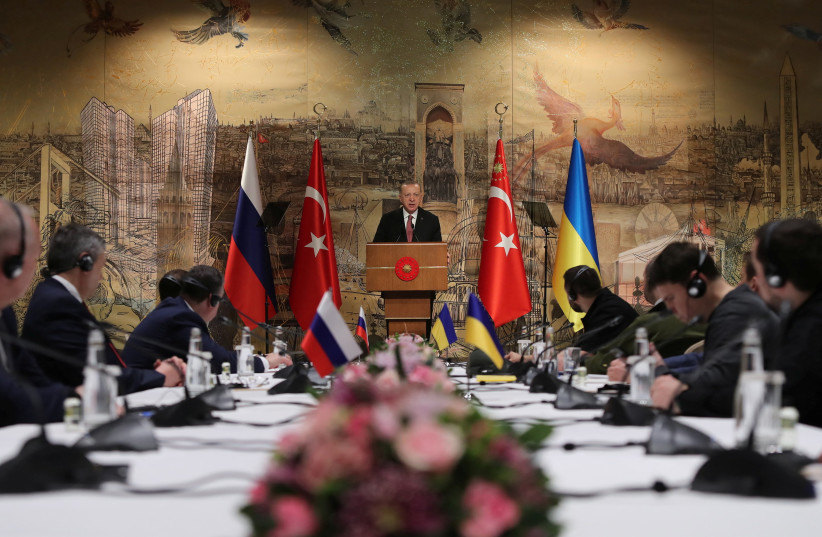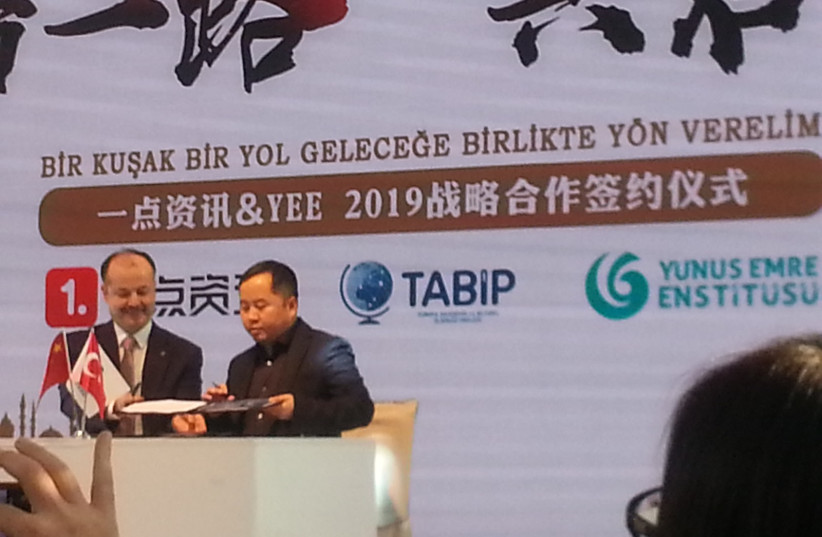The Turkish government said on Thursday that the country’s state banks were suspending the use of Russia’s Mir payment system, a month after the United States raised the possibility of sanctions.
Turkey’s Foreign Ministry confirmed the decision to the Reuters news agency after a Bloomberg report earlier this week stated the banks were planning on leaving the system, citing a senior Turkish official.
Cem Çakmaklı, an assistant professor of economics at Koç University in Istanbul, told The Media Line that Turkey’s weakened economy has made it especially vulnerable to possible sanctions.
Last year, the country’s currency lost 44% of its value and, according to government statistics, inflation has risen by more than 80% this year, although independent economists believe the number is much higher.
Çakmaklı cited Turkey’s large foreign debt and low foreign reserves at its central bank as especially concerning.

“From the Turkish side, it’s not so easy to confront the Western allies,” Çakmakli told The Media Line. “The economy is quite vulnerable.”
Erdogan said last week that Turkey was looking for an alternative to the Mir system, which allows for credit card payments, and two private banks said they were withdrawing from it.
Part of the appeal of the Mir system for Turkey appears to be that it would make it easier for Russian visitors to make payments in the country.
Does Russia provide for Turkish economy?
Russia is the second top source for Turkey’s key tourism sector and, with a struggling economy, the funds are especially needed.
However, Çakmaklı said that the damage from withdrawing from the Russian payment system would not be very significant for the Turkish economy now because the tourism season is nearing an end.
Last month, Erdogan said five banks were working on the Mir system.
Two weeks later, the US Treasury Department said it had warned Turkey’s Finance Ministry that Russia was trying to circumvent US sanctions through Turkey.
Afterward, the department sent a letter to a top Turkish business association warning that firms could face penalties if they work with sanctioned Russians.
NATO member Turkey has not imposed sanctions on Russia and has sought to maintain ties with both Moscow and Kyiv during the war in Ukraine.
Timothy Ash, an economist focused on Turkey and Ukraine, said that for private banks the decision to leave the system is very individualized, but that it would be difficult for state banks to continue working with the Mir system if they were the only banks operating with it.
“I think there’s a lot of pressure put on them by the US Treasury and Western governments, but maybe Turkey is also realizing that Putin is losing and they don’t want to be caught on the wrong side of history,” Ash told The Media Line.

Russian President Vladimir Putin himself admitted that ally China had “questions and concern” about Ukraine during a meeting earlier this month.
Ash said that the nuclear threats from Putin also could be pushing Erdogan away.
Putin once again implied that Russia is willing to carry out a nuclear strike during a national address on September 21 when he announced a mobilization of Russian men to fight in Ukraine and said he was “not bluffing” over his threat to use nuclear weapons.
The Russian president first raised the possibility in reference to Ukraine when he announced his country’s full-scale invasion in February, stating that if anyone tried to stop Russia they would face consequences that have not been seen before in history.
On Wednesday evening, Erdogan criticized such threats of nuclear war, stating in a television interview: “One should not even think about this, let alone talk about it. Solving this issue through diplomacy would be the most appropriate step,” the Turkish state news agency reported.
How is Turkey responding to neighboring threats?
Last week, the Turkish Foreign Ministry raised concerns over the so-called referendums in Russian-occupied territories in Ukraine, stating that the votes would increase instability and make diplomacy more difficult.
A statement from the ministry said that “illegitimate fait accomplis will not be recognized by the international community."
Ash said that Turkey’s withdrawal from the Mir system will send a message of the power of the US Treasury Department at the same time as showing the weakened position of Putin.
“[Erdogan] doesn’t want to be left exposed,” Ash said. “The writing’s on the wall for Putin.”
